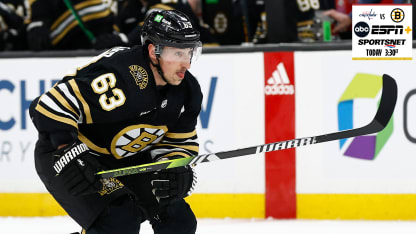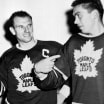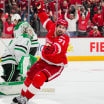BOSTON -- The seconds tick down in the second game of the World Cup of Hockey 2016 final between heavy favorite Team Canada and out-of-nowhere Team Europe. The score is 1-1 and seems headed for an overtime that no one had anticipated.
Drew Doughty is in the penalty box, leaving Team Canada shorthanded.
Jonathan Toews skates down the right side of the ice, carrying the puck, with Jay Bouwmeester trailing. As he crosses the blue line, another player jumps over the boards. Toews and Bouwmeester cross paths as they reach the top of the circle and the trailing player joins them in the offensive zone, just in time for Toews’s little tap of a backhand pass.
Brad Marchand is ready, a stride down the slot and a flick of the stick and a short-handed goal and pandemonium.
With 43.1 seconds remaining in regulation, Marchand is jumping into the arms of defenseman Alex Pietrangelo, his goal having won the tournament for Canada and sent the packed crowd in Toronto at what was then Air Canada Centre into hysterics.
It was the moment, and the tournament, that sent him into the stratosphere.
“Once I got to the World Cup, it was a huge awakening for me that a big part of the reason the best players are the best players -- yes, it’s their skill -- but it’s their mindset,” Marchand said in a lengthy sit-down with NHL.com. “They know that they’re the best. They go out there every night and they know that they’re going to control the game. They just hold onto pucks in areas where other guys won’t and don’t.
“After I played alongside them, I knew that I could be at that level. It was just a mindset change for me. After that I’d go on the ice and I would literally feel -- and I would tell the other team’s coach and the players -- that you can’t control me, you can’t beat me. I just got into such a mindset that I believed it every day, every day in practice, every day in games, and it just propelled me to another level.”


















